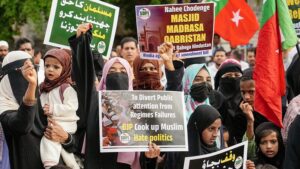
M Ghazali Khan
Indian Muslims breathed a sigh of relief after the Supreme Court put on hold the government’s plans to appoint two non-Muslims to the administration of Muslim endowments, known as waqf, and to deprive the community of possession of thousands of acres of land worth billions of rupees.
On 16 April, the apex court began hearing several petitions filed against the Waqf (Amendment) Act, 2025. It stayed two of the most contentious provisions of the Act—namely, the appointment of two non-Muslims to the Waqf Boards and the granting of additional powers to the government to validate land holdings—until the next hearing, scheduled for 5 May 2025.
The Act is widely perceived as the most serious legislative attack on Muslims by the Hindutva (Hindu supremacist) government, enacted through a bill passed in Parliament.
The All India Muslim Personal Law Board (AIMPLB), an umbrella organisation representing Indian Muslims in religious matters, has called on the community to continue peaceful protests until the government fully withdraws the bill. Demonstrations have already taken place in Delhi, Hyderabad, Mangalore, and other cities across India.
Understanding Waqf
Waqf is an Islamic endowment system in which property is permanently dedicated for charitable or religious purposes by transferring ownership to Allah. Once designated as waqf, a property cannot be sold or repurposed beyond its original intent.
In India, waqf properties span an estimated 3.8 to 3.9 million acres and are believed to be worth approximately ₹1.2 lakh crore (around USD 14.4 billion). These include graveyards (1,50,516 properties, or 17%), mosques (1,19,200 properties, 14%), agricultural lands (1,40,784 properties, 16%), and commercial/residential assets such as shops (1,13,187) and homes (92,505).
Governance and Corruption in Waqf Boards
Each Indian state has a Waqf Board, administered by state-appointed officials under government-run Waqf ministries and coordinated by the Central Waqf Council. Notably, the Muslim community has no say in the selection or appointment of these board members.
Like many Indian public institutions, Waqf Boards have been plagued by corruption. Experts estimate that if efficiently managed, waqf properties could generate at least ₹1,405 crore (approximately USD 169 million) annually. However, in the 2023–24 fiscal year, the net income from waqf properties in three unnamed states was just ₹1.26 crore (about USD 152,000). Several other states reported no income at all.
One striking example of political patronage and misuse is the case of Jitendra Narayan Singh Tyagi (formerly Syed Waseem Rizvi), who chaired the Shia Central Waqf Board from 1995 to 2015. Despite facing corruption charges, he remained in power under successive governments—SP, BSP, and BJP. To please his new Hindutva bosses in the BJP, he not only converted—or blackmailed to accept—Hinduism but also began making highly Islamophobic and anti-Muslim statements.
Government Propaganda and the Waqf Narrative
Despite Waqf Boards being statutory government bodies, Prime Minister Narendra Modi’s Hindutva government has portrayed Muslims as responsible for the Boards’ corruption.
The government has defended the new law by alleging that Waqf Boards function unchecked and have made illegal claims over properties. Another narrative pushed by the BJP is that Waqf is the third-largest landowner in India, after the army and the railways, implying undue Muslim privilege. However, according to Barrister Asaduddin Owaisi, Member of Parliament and President of All India Majlis-e-Ittehadul Muslimeen (AIMIM), Hindu temples in just four Indian states collectively hold over 10 lakh (one million) acres of land. ‘In Tamil Nadu, temple and math land account for 4.78 lakh acres. In Andhra Pradesh, Hindu endowment land covers 4 lakh acres. In Telangana, 87,000 acres belong to Hindu endowments, and in Odisha, 13 temples control 12,776 acres, according to CAG. These four states alone amount to 10 lakh acres, and I haven’t even added Uttar Pradesh, Maharashtra, Bihar, Bengal, Assam, and Jharkhand.’ Owaisi said.
The BJP government and its leaders have gained notoriety in the country for spreading falsehoods and making bizarre statements made by its leaders. In one such display of shamelessness, BJP spokesperson Sambit Patra falsely claimed in a parliamentary speech that Waqf properties do not exist in several Muslim-majority countries, including Turkey, Egypt, and Iraq. He even posted the video of this speech on X, reiterating these claims. In reality, all of these countries have established waqf institutions, and Turkey even has a Waqf Museum in Ankara.
https://x.com/i/status/1907466815577710711
By giving baseless examples of Muslim countries, BJP leaders attempt to convince their Hindu voters that previous secular governments—especially the Congress—granted Muslims privileges that they allegedly do not enjoy even in Muslim-majority countries.
Before the Bill was presented on 8 April in the Parliament, a Joint Parliamentary Committee (JPC) had proposed 32 amendments. However, only 14 minor changes were ultimately accepted. Nevertheless, the government falsely asserted on the floor of Parliament that all of the committee’s recommendations had been incorporated.
Most Contentious Provisions of the New Act
The new Act removes the provision of ‘waqf by user,’ which previously allowed properties used for charitable or religious purposes to be designated waqf. Since formal registration of waqf properties began only in 1954, this change endangers thousands of properties, including mosques, donated centuries ago, without formal registration. Despite the Supreme Court’s stay on this provision, BJP-led state governments have already begun preparing waqf properties that do not have formal documents.
Another highly controversial provision is the mandatory inclusion of two non-Muslims on Waqf Boards. This is a significant departure from the norm, as all religious communities in India typically manage their institutions.
According to Tasleem Rehmani, President of the Muslim Council of India: ‘Apart from the issue of ‘waqf by user’ and the inclusion of non-Muslim members in Waqf Boards, there are also some very fundamental concerns. For example, the elimination of waqf in tribal areas, where there are nearly one hundred thousand waqf properties, in places like Lakshadweep, among others. Secondly, the law gives complete control of waqf properties to the Archaeological Department, including thousands of mosques, shrines, and the lands attached to them that are over a hundred years old. Thirdly, this law renders the Places of Worship (Special Provisions) Act, 1991, ineffective. This, too, could become a major issue in the future.’
Widespread Opposition
Protests have erupted across India against the new law, and opposition politicians have condemned it as the most divisive and discriminatory law against Muslims. ‘Even when Supreme Court verdicts went against us—on Babri Masjid and Triple Talaq—we accepted them because we believe in constitutional morality. But now you pass a law to snatch our properties just because you have a majority. So we went to the Court.’ Asaduddin Owaisi said, addressing a rally in Hyderabad.
In a video statement, Congress leader and senior advocate Abhishek Manu Singhvi said, ‘This is not reform. It is retaliation—meticulously scripted, strategically timed, and constitutionally questionable… Behind the bland language of governance lies a bold ambition for control.’
A Broader Political Context
Since taking office in 2014, the Modi-led BJP government has targeted and marginalised Muslims in many ways. It has shown revolting silence on the lynchings of Muslims by the so-called cow vigilantes, interfered with Muslim personal laws, got the Supreme Court to deliver a verdict favouring Hindus in the Babri Masjid case, and revoked Article 370, stripping Jammu & Kashmir of its special status.
In a video posted on the social media platform X the ruling party has announced that its next step will be to impose a Uniform Civil Code.
https://twitter.com/i/status/1913978464996073775
Critics see the Waqf (Amendment) Act as yet another attempt to seize Muslim assets and erode their constitutional protections guaranteeing freedom to practice and preach religion and the right to run their institutions. They argue the Act has less to do with governance and is more about signalling a hardline agenda to the BJP’s electoral base.
A Moment of Reckoning
The role of Muslim organisations has been quite disappointing—not just on the Waqf issue but across the board. They tend to react only when the situation becomes dire, when the water is already neck deep. We are all aware of the rampant corruption plaguing the Waqf Boards. While the current Hindutva-led government portrays these boards as being Muslim-run, the reality is that they are statutory bodies where Muslim organisations have no real control. Yet, these institutions are fundamentally Muslim. Despite this, there has been no serious initiative from Muslim organisations to consult among themselves and engage with even past ‘secular’ governments to push for reform in what is a potentially resource-rich but practically impoverished institution.
Although the Supreme Court’s comments on the Act and questioning the Central Government on two counts have given Muslims a temporary relief, many remain sceptical, given the Court’s previous record in the Babri Mosque and Triple Talaq cases. Still, to restore its credibility without directly confronting the government, the Apex Court may attempt to find a middle path—one that validates key changes in the Act while appearing to protect minority rights on the two most contentious points in it.
If the Court rejects removing the ‘waqf by user’ clause and eliminates the requirement for two non-Muslim board members, it may be considered a compromise in some quarters. While such a verdict would still be detrimental to the interests of the Muslim community, some may consider it justified in light of widespread mismanagement and corruption within Waqf Boards.
It is not far-fetched to fear that, if the current trend of corruption continues within the Waqf Board, most waqf properties—aside from mosques and madrasas—may disappear within two to three decades. Perhaps this severe jolt delivered by the Hindutva government could serve as a divine wake-up call, prompting the Muslim community to address the long-standing issues within its institutions.
May the community succeed in repealing this unjust act. But we must remember: repealing the law is not enough. Transparency and integrity are essential—not just in waqf, but across every institution in the community. The real question is whether those in charge—or those who have seized control—are truly committed to using milli institutions for their intended purpose. And are they ready to embrace true transparency?
